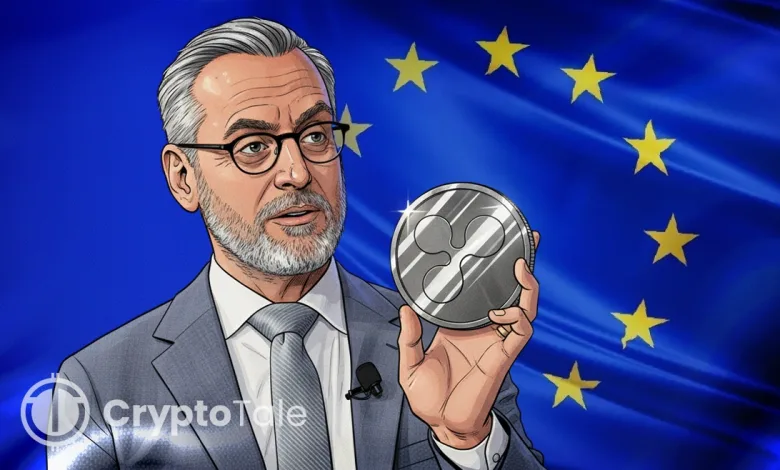Ripple Excited for Growth in Luxembourg, Eyes EU Expansion

- Ripple moves closer to securing a Luxembourg e-money license as MiCA defines EU crypto rules.
- Luxembourg allocates 1% of its sovereign fund to Bitcoin, showing rising confidence in crypto.
- Ripple’s global reach expands with new partnerships in Europe, BBVA, and Bahrain.
Ripple is tightening its regulatory foothold in Europe as it moves closer to securing a license to operate in Luxembourg, one of the European Union’s (EU) most crypto-forward nations. The development marks another step in the blockchain firm’s growing alignment with Europe’s new regulatory framework and expanding institutional adoption across the region.
During a recent meeting with Luxembourg’s Finance Minister, Gilles Roth, Ripple’s Chief Legal Officer, Stuart Alderoty, expressed optimism about the company’s future in the EU. “Ripple is excited about our future in Luxembourg and the EU,” he said, emphasizing that the firm views Luxembourg as a vital hub for its next stage of growth.
Roth confirmed the meeting, stating that discussions centered around Ripple’s ambitions and Luxembourg’s focus on digital innovation. Cassie Craddock, Ripple’s Managing Director for the UK and Europe, echoed similar sentiments on social media.
“With MiCA now rolled out across the EU, nations like Luxembourg have the opportunity to lead globally in developing their local digital assets industry,” she said, adding that Luxembourg “really understands the opportunity ahead” and that Ripple stands ready to support the nation’s blockchain ambitions.
Luxembourg’s Crypto Ambition Grows
Luxembourg’s proactive approach to digital finance is rapidly earning it a leadership position within the EU’s crypto ecosystem. Earlier this week, the country’s sovereign wealth fund, FSIL, announced a landmark decision to allocate 1% of its reserves into Bitcoin and other digital assets, a first among European nations.
The move follows the country’s updated investment policy, approved in July 2025, which allows up to 15% of FSIL’s assets to be allocated to alternative investments, including cryptocurrencies, real estate, and private equity.
Jonathan Westhead, communications lead at the Luxembourg Finance Agency, said the step “recognizes the growing maturity of this new asset class” and reflects Luxembourg’s leadership in digital finance.
Although the investment size is relatively small, analysts view it as a turning point for Europe’s perception of Bitcoin as a legitimate institutional asset. Ripple’s engagement with Luxembourg’s financial leadership signals that both the public and private sectors are preparing to leverage blockchain as part of the region’s evolving financial framework.
Related: Ripple Seeks OCC Banking License with Trust Bank Application
Ripple Aligns With MiCA’s Regulatory Clarity
Ripple’s efforts to secure an e-money institution license in Luxembourg follow the EU’s rollout of the Markets in Crypto-Assets (MiCA) regulation in December 2024. MiCA establishes unified licensing, custody, and compliance rules across all member states, giving firms like Ripple a clear path to operate throughout the entire European Economic Area (EEA) once they are licensed.
Earlier this year, Ripple incorporated a local entity in Luxembourg as part of its application process. The license, upon approval, would enable Ripple to deliver its services related to payments, stablecoins, and blockchain infrastructure across 30 European markets.
Alderoty praised the EU’s regulatory foresight, giving credit to MiCA as the most comprehensive digital asset framework and pointing it out as a model for balanced supervision and innovation. Ripple’s growing list of European clients reflects this momentum.
Spanish banking firm BBVA recently integrated Ripple’s custody solution. At the same time, Schuman Financial launched a MiCA-compliant euro stablecoin on the XRP Ledger in May, signaling growing institutional trust in Ripple’s technology and the EU’s regulated crypto environment.
Ripple’s Broader Expansion Momentum
Ripple’s emphasis on Europe is paired with the fast-paced expansion in other parts of the globe. The company revealed on October 9 a strategic alliance with Bahrain Fintech Bay, the incubator of pilot fintech linked to the government in the Middle East.
The joint effort is expected to enable the deployment of blockchain, organize educational programs, and promote innovative initiatives within Bahrain’s financial ecosystem. Moreover, Ripple has recently been conferred the PAY360 Award for its “Best Initiative with Digital Currencies or Assets” in recognition of its efforts to transform cross-border payment transactions.
The award, presented by the Payments Association, highlights Ripple’s real-world utility and its success in reducing global transaction costs by up to 70%.




